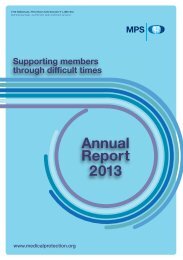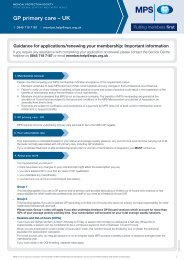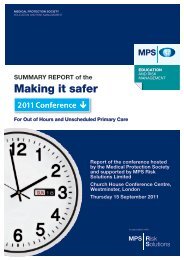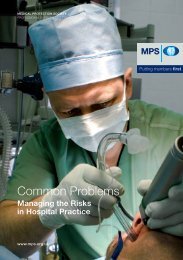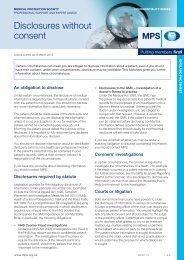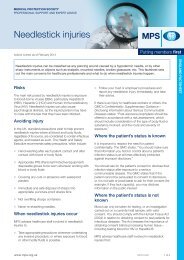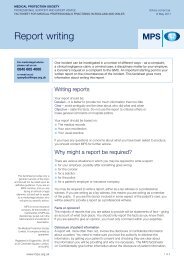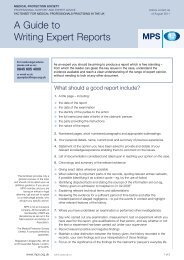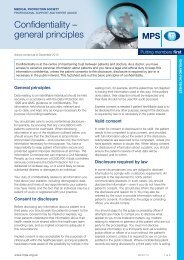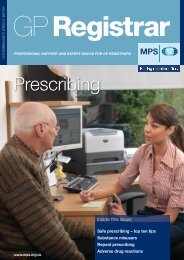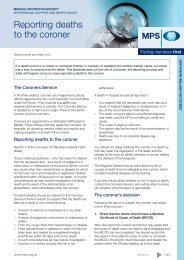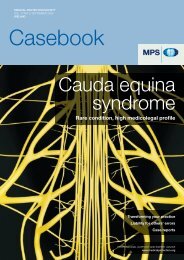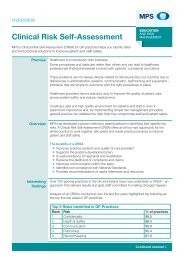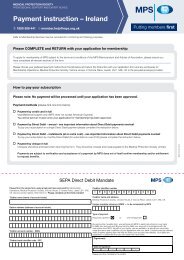Dr Rob Hendry - Medical Protection Society
Dr Rob Hendry - Medical Protection Society
Dr Rob Hendry - Medical Protection Society
Create successful ePaper yourself
Turn your PDF publications into a flip-book with our unique Google optimized e-Paper software.
10<br />
SPECIAL FEATURE<br />
UNITED KINGDOM CASEBOOK | VOLUME 19 | ISSUE 1 | JANUARY 2011 www.mps.org.uk<br />
patients. It is estimated that<br />
1.5-2% of all US cancers are<br />
attributable to CT scans. 11<br />
<strong>Dr</strong> Lawrence Ng, an MPS<br />
medicolegal consultant based<br />
in Singapore, says that during<br />
the last 20 years, doctors in Asia<br />
have become more careful in<br />
their diagnostic work. “There is a<br />
greater tendency to order more<br />
tests and x-rays to support one’s<br />
clinical diagnosis. Although in a<br />
patient safety-saturated culture<br />
it is prudent to do this, it does<br />
raise costs and patient anxiety.”<br />
WOULD DEFENSIVE<br />
MEDICINE LOWER THE<br />
RISK OF LITIGATION?<br />
No, defensive medicine is<br />
different from defensible<br />
practice, which is good<br />
practice – defensive medicine<br />
is not: it could, in fact, make<br />
your practice more risky.<br />
Kravitz et al attempted to<br />
quantify the risk presented by<br />
defensive medicine by analysing<br />
malpractice claims from a single<br />
north-eastern state in the USA.<br />
Claims ascribed to diagnostic<br />
and monitoring omissions<br />
accounted for less than 5%. 12<br />
The overall incidence rate was<br />
1.7 per 100 doctor-years, so<br />
the average doctor practising<br />
in one of the specialties studied<br />
would be sued for omitting<br />
a necessary diagnostic test<br />
once every 59 years!<br />
Doctors seeking to lower<br />
malpractice risk would avert<br />
very few lawsuits by ordering<br />
more diagnostic tests and<br />
monitoring procedures than<br />
they do now. In fact, ordering<br />
more tests could increase the<br />
malpractice risk, according to<br />
Michael Jones, who argues that<br />
doctors could be considered<br />
negligent for overtesting. 13<br />
Budetti supports these<br />
assertions: “The greatest irony is<br />
that defensive medicine may be<br />
counterproductive and actually<br />
might increase malpractice<br />
risk… Unnecessary treatment<br />
and invasive procedures… are<br />
themselves potentially serious<br />
violations of the standard of<br />
care and could be the basis<br />
of malpractice litigation.” 14<br />
MPS medicolegal adviser <strong>Dr</strong><br />
Janet Page draws on both these<br />
points: she argues that as some<br />
tests may be invasive and have<br />
their own inherent risks, doctors<br />
Box A: To avoid complaints and claims, MPS members said they:<br />
Refer more patients for a second opinion<br />
Are more careful to ensure that the correct<br />
follow-up arrangements are in place<br />
Conduct more investigations<br />
Changed prescribing habits<br />
Kept more detailed records<br />
Have a lower threshold for removing<br />
patients from practice lists<br />
Stopped dealing with certain<br />
conditions/performing certain procedures<br />
could potentially be criticised for<br />
ordering investigations that are<br />
not in patients’ best interests<br />
(eg, if the risks associated with<br />
the procedures outweigh any<br />
potential benefit to the patient).<br />
So if a doctor refused to<br />
order a test that established<br />
medical guidelines state is not<br />
necessary, could they be sued?<br />
<strong>Dr</strong> Page answers: “A doctor<br />
can always be sued, but<br />
the claim is very unlikely to<br />
succeed if the doctor is acting in<br />
accordance with a responsible<br />
body of medical opinion (Bolam)<br />
and whether those decisions<br />
stand up to logical analysis and<br />
scrutiny (Bolitho). If a doctor<br />
takes the time and trouble to<br />
explain to patients the reason<br />
for the decision in the first place,<br />
it may reduce the chance of<br />
the patient bringing a claim.”<br />
According to <strong>Dr</strong> Page, overcautious<br />
doctors are unlikely to<br />
decrease the rate of negligence<br />
claims. Most claims arise<br />
not because of substandard<br />
care, but because of a failure<br />
in communication between<br />
the doctor and patient.<br />
So, defensive medicine could<br />
itself damage the doctor–patient<br />
relationship if a patient perceived<br />
that a doctor was acting simply<br />
to protect their own position,<br />
rather than out of a desire to do<br />
what was best for the patient.<br />
Another element of this is<br />
that in countries with a lot of<br />
private patients, they may be<br />
motivated by money, specifically<br />
getting their medical fees<br />
reimbursed. This will generate<br />
a proportion of claims that<br />
are clear “try-ons”; practising<br />
defensively is unlikely to impact<br />
on these cases, nor deter the<br />
patients from pursuing them.<br />
0 20 40 60 80 100<br />
% agreeing<br />
HOW TO AVOID<br />
PRACTISING DEFENSIVELY<br />
Remember the risk of<br />
being sued is low<br />
The chances of being sued are<br />
much lower than you think. If<br />
you study the number of clinical<br />
consultations and the percentage<br />
that result in a claim, it is a low<br />
incidence. Doctors should not be<br />
paranoid about being sued as this<br />
is not evidence-based thinking. If<br />
you can justify your decision not to<br />
order a test, it can be defended.<br />
Rachel Morris, an MPS solicitor,<br />
says: “If you are sued you will<br />
be asked why you did or did not<br />
do something. A defence will<br />
not be based on the number<br />
of tests you did, but the clinical<br />
reasoning behind your actions.<br />
“As long as you can look<br />
back and justify your decision in<br />
accordance with a responsible<br />
body of opinion, you are<br />
safeguarding your practice. That<br />
is why it is so important to keep<br />
good notes, so that you will be<br />
able to remember the clinical<br />
reasoning behind your decisions.”<br />
STRATEGIES TO MINIMISE<br />
DEFENSIVE MEDICAL PRACTICES<br />
■ Communicate effectively with patients,<br />
explaining what you are doing and why<br />
■ Have robust systems for follow-up<br />
■ Be open about risk<br />
■ Offer an appropriate standard of care<br />
■ Only order tests based on a thorough clinical<br />
history and examination<br />
■ Discuss difficult cases with colleagues<br />
■ Keep clear and detailed documentation<br />
■ Know what it is you seek to exclude or confirm<br />
with a test to determine if it’s necessary<br />
■ Identify learning needs (find good mentor)<br />
■ Undertake courses or independent study.



